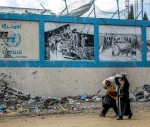You are here
A project against ignorance
May 19,2019 - Last updated at May 19,2019
In 1999, Argentine-Israeli conductor Daniel Barenboim and the late Palestinian-American academic Edward Said founded jointly the West-Eastern Divan Orchestra. This is a youth orchestra consisting of musicians from countries in the Middle East, of Egyptian, Iranian, Israeli, Jordanian, Lebanese, Palestinian, Syrian and Spanish background.
The orchestra’s declared objective is to promote understanding between Israelis and Palestinians, and pave the way for a peaceful and fair solution of the Arab-Israeli conflict. But Barenboim puts it more modestly:
“The Divan... has very flatteringly been described as a project for peace. It isn’t. It’s not going to bring peace, whether you play well or not so well. The Divan was conceived as a project against ignorance.”
I mention this because there are few things that are more refreshing than the rare occasions when someone launches an initiative against ignorance. These instances are rare because normally people do not fight ignorance but entrench themselves in it.
Last week, there was reason to take heart. Democratic members of the US House of Representatives Jan Schakowsky and Ilhan Omar jointly published an op-ed piece in which they wrote: “As a Muslim American and a Jewish American elected to the United States Congress, we can no longer sit silently as terror strikes our communities... our two communities, Muslim and Jewish, must come together to confront the twin evils of anti-Semitic and Islamophobic violence.”
The congresswomen were referring to the shooting at a synagogue in Poway, California last April, which was the most recent occurrence in a rising spate of white supremacist hate crimes against Jewish and Muslim targets.
But this initiative also has a global significance. It comes at a time when ignorance and hatred seem to be gaining the upper hand all over the world. We seem to live in a fundamental failure of democracy, where more and more governments are gaining power on populist xenophobic programmes.
This global rise in populism and xenophobic nationalism is alarmingly reminiscent of the situation in Europe in 1938, which was famously described as: “the lights are going out”.
Nationalist xenophobia fuels racist acts of terror, which are invariably inspired by immense hatred, and fear of a perceived looming threat. These threats may appear absurd to an outsider, but they are very keenly felt.
A recent stark example was the speech given last month by Israel’s Education and Diaspora Affairs Minister Naftali Bennett, in which he lamented that assimilation is one of the greatest disasters threatening the Jewish people.
Really? Does Bennett feel threatened because some societies accept and embrace Jews in their midst instead of discriminating against them?
The point is that you cannot win against xenophobia. No matter what you do, someone will see it as a threat and hate you for it.
Fortunately, though, there are sane and rational people who would put away their petty fears to focus on the real threats that face their communities and the whole world. Let us pray for the day when the Middle East does the same.













